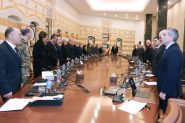
Israeli Army Issues 18 Urgent Evacuation Warnings Across Lebanon
This is Beirut 02/03 14:45

This is Beirut 02/03 14:45

This is Beirut 02/03 13:45

This is Beirut 02/03 13:25

Natasha Metni Torbey 02/03 12:55

This is Beirut 02/03 11:30

This is Beirut 02/03 16:00

This is Beirut 02/03 15:45

This is Beirut 02/03 14:30

This is Beirut 02/03 10:45

This is Beirut 02/03 10:00
Selena Ryan 10/02 10:05
This is Beirut 03/02 19:45
This is Beirut 03/02 09:00
This is Beirut 27/01 21:15

This is Beirut 13/02 13:30

This is Beirut 2025-12-21 15:05

This is Beirut 2025-12-21 12:05

Eleonore Stephan for Huna Lubnan 2025-12-21 09:05

This is Beirut 2025-12-20 18:05

This is Beirut 12/01 18:15

This is Beirut 09/01 20:40

This is Beirut 08/01 17:30

This is Beirut 07/01 20:45

This is Beirut 06/01 17:00

Makram Haddad 2025-12-19 08:40

Makram Haddad 2025-12-18 08:50

Makram Haddad 2025-12-17 11:30

Makram Haddad 2025-12-16 09:30

Makram Haddad 2025-12-12 11:10

Bélinda Ibrahim 2025-12-17 11:00

Makram Haddad 2025-12-17 08:50

Bélinda Ibrahim 2025-12-11 10:30

Bélinda Ibrahim 2025-12-10 12:00

Bélinda Ibrahim 2025-12-04 15:05